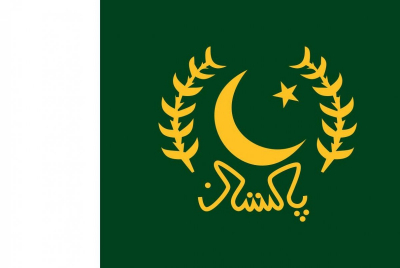Agha Muhammad Yahya Khan , commonly known as Yahya Khan, was a Pakistani general who served as Chief Martial Law Administrator of Pakistan from 25 March 1969 until December 1971. During his dictatorship, he ordered Operation Searchlight in an effort to suppress Bengali nationalism which triggered the Bangladesh Liberation War. He was central to the perpetration of the Bangladesh genocide, the genocide of the populace of modern-day Bangladesh which resulted in death of 300,0003,000,000 Bengalis.
Having participated in the Mediterranean theatre of World War II on behalf of Great Britain's British Indian Army, he opted for Pakistani citizenship and joined its military after the United Kingdom partitioned India in 1947, and helped in executing the covert infiltration in Indian Kashmir that sparked the war with India in 1965. After being controversially appointed to assume the army command in 1966, Yahya Khan took over the presidency who was not able to deal with the 1969 uprising in East Pakistan, forced to resign by protests and offered him the office. Yahya Khan subsequently enforced martial law by suspending the constitution. Holding the nation's first nationwide elections in 1970, 23 years after independence, he delayed the power transition to victorious Sheikh Mujibur Rahman from East Pakistan, which further inflamed the civil violent unrest in the East, and authorised the East Pakistani authorities to violently suppress dissent leading to the Bangladesh Liberation War and the creation of Bangladesh. Along with Tikka Khan, he is considered a chief architect of the 1971 Bangladesh genocide which according to independent researchers led to the deaths of 300,000 to 3,000,000 people.Pakistan suffered a decisive defeat in the Bangladesh Liberation War of 1971, resulting in the dissolution of the Eastern Command of the Pakistan Army and the secession of East Pakistan as Bangladesh thus Yahya Khan's rule is widely regarded as a leading cause of the break-up of Pakistan. Following these events, he turned over the leadership of the country to Zulfikar Ali Bhutto, the leading politician from West Pakistan, and resigned from the command of the military in disgrace, both on 20 December 1971. He was then stripped of his service honours and put under house surveillance for most of the 1970s.After being released from these restrictions in 1977, he died in Rawalpindi in 1980. He is viewed largely negatively by Pakistani historians and is considered among the least successful of the country's leaders.
The president of Pakistan (Urdu: صدر پاکستان, romanized: s̤adr-i Pākiṣṭān), officially the President of the Islamic Republic of Pakistan, is the ceremonial head of state of Pakistan and the commander-in-chief of the Pakistan Armed Forces.The office of president was created upon the proclamation of Islamic Republic on 23 March 1956. The then serving governor-general Iskander Mirza assumed office as the first president. Following the 1958 coup d'etat, the office of prime minister was abolished, leaving Presidency as the most powerful office in the country. This position was further strengthened when the 1962 Constitution was adopted. It turned Pakistan into a Presidential Republic, giving all executive powers to the president. In 1973, the new Constitution established Parliamentary democracy and reduced president's role to a ceremonial one. Nevertheless, the military takeover in 1977 reversed the changes. The 8th Amendment turned Pakistan into a semi-presidential republic and in the period between 1985 and 2010, the executive power was shared by president and prime minister. The 18th Amendment in 2010 restored Parliamentary Democracy in the country, and reduced presidency to a ceremonial position.
The constitution prohibits the president from directly running the government. Instead, the executive power is execrsised on his behalf by the prime minister who keeps him informed on all matters of internal and foreign policy, as well as all legislative proposals. The Constitution however, vests the president with the powers of granting pardons, reprieves, and the control over the military; however, all appointments at higher commands of the military must be made by the President on a "required and necessary" basis, upon consultation and approval from the prime minister.The president is indirectly elected by the Electoral College for a five-year term. The Constitution requires the president to be a "Muslim of not less than forty five (45) years of age". The president resides in an estate in Islamabad known as Aiwan-e-Sadar (President's House). In his absence, the chairman of Senate exercises the responsibilities of the post, until the actual president resumes office, or the next office holder is elected.
There have been a total of 13 presidents. The first president was Iskander Ali Mirza who entered office on 23 March 1956. The current office holder is Arif Alvi, who took charge on 9 September 2018, following his victory in the 2018 elections.

1971Mar, 1
President of Pakistan Yahya Khan indefinitely postpones the pending national assembly session, precipitating massive civil disobedience in East Pakistan.
Choose Another Date
Events on 1971
- 8Jan
Zulfikar Ali Bhutto
Bowing to international pressure, President of Pakistan Zulfikar Ali Bhutto releases Bengali leader Sheikh Mujibur Rahman from prison, who had been arrested after declaring the independence of Bangladesh. - 7Jun
First Amendment to the United States Constitution
The United States Supreme Court overturns the conviction of Paul Cohen for disturbing the peace, setting the precedent that vulgar writing is protected under the First Amendment to the United States Constitution. - 11Jul
Chile
Copper mines in Chile are nationalized. - 21Sep
Bhutan
Bahrain, Bhutan and Qatar join the United Nations. - 24Nov
D. B. Cooper
During a severe thunderstorm over Washington state, a hijacker calling himself Dan Cooper (aka D. B. Cooper) parachutes from a Northwest Orient Airlines plane with $200,000 in ransom money. He has never been found.

 English
English  español
español  français
français  português
português  русский
русский  العربية
العربية  简体中文
简体中文 